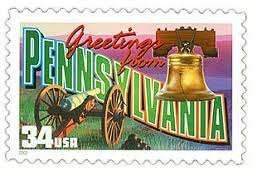Pennsylvania Online Poker Bill Introduced
A new bill seeking to legalize and regulate the offering of Pennsylvania online poker and other forms of online gambling has been introduced by PA State representative John Payne (R-Dauphin). Payne, who represents Pennsylvania’s 106th district, near Harrisburg in the central part of the state, introduced his online gaming bill on Wednesday, less than two weeks after announcing his plans to introduce such legislation in the Keystone State.
 Payne’s new bill has already been designated as HB 649 (House Bill 649), though the complete text of the bill has yet to be made available via the state’s legislative tracking sites. Nonetheless, a few key provisions of the bill are already known, including its call for a hefty 14% tax on gross revenue for the offering of online gambling services, the licenses for which would be restricted to those entities who are already licensed to provide gambling at land-based casinos in the state.
Payne’s new bill has already been designated as HB 649 (House Bill 649), though the complete text of the bill has yet to be made available via the state’s legislative tracking sites. Nonetheless, a few key provisions of the bill are already known, including its call for a hefty 14% tax on gross revenue for the offering of online gambling services, the licenses for which would be restricted to those entities who are already licensed to provide gambling at land-based casinos in the state.
Here’s the text of a memo Payne sent to his state Congressional counterparts earlier this month, announcing his planned introduction of the bill:
Posted: February 13, 2015 12:03 PM
From: Representative John Payne
To: All House members
Subject: Cosponsorship: Payne – Interactive GamingIn the near future, I plan on introducing legislation that would authorize Interactive Gaming in Pennsylvania. A recent study from the Legislative Budget and Finance Committee found that Internet Gaming is a large new source of revenue from which the Commonwealth could benefit.
Developments in technology and recent legal decisions have created an opportunity to legalize interactive gaming as a means to further enhance and complement the benefits delivered by casino gaming, licensed facilities and the communities in which they operate. [I-]Gaming has already been authorized in nearby states that directly compete with our current licensed casinos. Many Pennsylvania residents participate in illegal and unregulated gaming sites. Establishing a strong regulatory framework under the Gaming Control Board will assist in shutting down these illegal sites and enhance consumer protection for our gaming residents.
Specifically my bill will do the following:
- Require all internet gaming to be conducted under the current gaming licensees.
- Require a licensing fee of $5 million per license.
- Tax all gross interactive gaming revenue at 14%
If you have any questions about the legislation, please contact Kelly Roth at 787-2684 or via email at [email protected].
Payne also chairs the Pennsylvania House Gaming Oversight Committee, to which his bill has already been assigned. His position as the committee’s chairman makes it likely that the bill will receive a full committee review later this spring. The state’s Gaming Oversight committee has already scheduled several informational hearings regarding the regulation of online gambling. One or more of those hearings may now be dovetailed to align with preliminary consideration of Payne’s new regulatory measure.
Through his Harrisburg-based office, Rep. Payne issued a brief statement in which he urged the regulation of Pennsylvania online gaming.
Wrote Payne’s press officer:
HARRISBURG – In an effort to provide much-needed consumer protections while generating additional revenue for the Commonwealth, House Gaming Oversight Committee Chairman John Payne (R-Dauphin) today introduced legislation to regulate online gaming in Pennsylvania.
“Right now millions of Americans, including Pennsylvanians, participate in illegal online gaming where no regulation currently exists,” said Payne. “By enacting effective state policy, we can help curb the illegal market while ensuring strong safeguards are in place to protect consumers.”
A recent study released by a Philadelphia-based economic consulting firm named Internet gaming the largest potential new revenue source for Pennsylvania’s gaming industry. If enacted, the study estimates online gaming would generate approximately $120 million in the state for the first year. Some gaming officials have estimated it could bring an excess of $300 million in ongoing revenue.
“We are currently facing a projected $2 billion budget shortfall,” said Payne. “I think it’s important we consider all responsible options to boost revenue before we consider asking our taxpayers for more money to fill that deficit.”
Regulating online gaming will also give Pennsylvania the opportunity to become a top competitor among its neighboring states in the gaming industry, Payne added.
“The implementation of legalized online gaming in Nevada, New Jersey and Delaware demonstrates the technologies exist to regulate Internet gaming safely and effectively,” he said. “This legislation is the first step toward ensuring future growth as the industry expands.”
Payne’s bill includes strong consumer protections such as placing limits on deposits and losses and implementing safeguards to prevent minors from playing. It also includes measures to help problem gamblers.
More specifics from Payne’s new online gambling legislation will be examined when the full text of HB 649 becomes available.



















COMMENTS